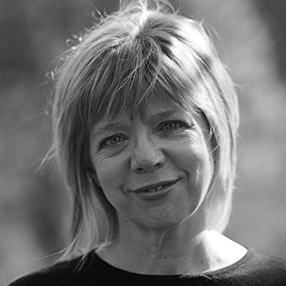Sidereal
Consider this an elegy with silo and fever.
Call it barn and gravel and gone. Grasses’ obeisance
in the wake of a pick-up, sun searing the leaves
green to gold in the season’s time-elapse.
Where does it go, the Sunday angle of sunlight
once only yours, wide and open as a window?
Here’s what I remember: the flaking mural
on the brick wall of neighborhood grocery, saying
Food for the Revolution for twenty-five years.
Stacked landscapes in my rearview, blank as a calendar
until a bend in the road brought the Blue Ridge;
the pocked metronome of tennis balls outside
while I harnessed what I had lost and missed
in minor-key pentameter. So what, my mentor
talked back to his tercets in draft after draft:
so what so what so what. “This essay is accurate
but never ignited,” the Derridean scrawled
in red ink when I was writing about Bishop writing,
I can scarcely wait for the day of my imprisonment.
Her keen eye ever cast on the homely unheimlich.
Call this a road story about the slow burn of foliage,
about containment, what conspires against arrival.
Astonish us, Diaghilev said to Cocteau,
but all I ever wanted was to consider,
its roots in the auguries of our shifting stars.
Copyright © 2023 by Debra Allbery. Originally published in Poem-a-Day on May 11, 2023, by the Academy of American Poets.
“‘Sidereal’ is, as the poem declares itself, a road story, a cross-country retrospective traversing decades. It is, as it also states, an elegy—in part honoring a past teacher, Larry Levis. The ‘so-what-so-what’ refrain is his, handwritten above a line on an early draft of his poem ‘Caravaggio: Swirl & Vortex.’ That self-interrogation set in motion a poem of motion that longs for dwelling—as did the swirl and vortex of etymology, sidereal and consider both deriving from sidereus, meaning ‘star,’ itself of uncertain origin.”
—Debra Allbery

